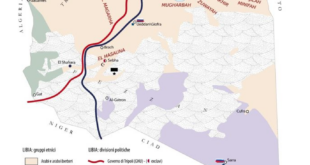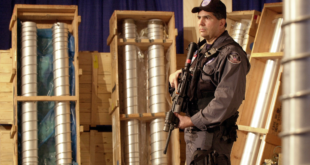TIZI OUZOU, Algeria (Reuters) – A car bomb exploded near a police station in a town east of Algiers on Sunday, wounding 25 people including four policemen, the government of the OPEC member country said.
The blast happened at about 5 a.m. (0400 GMT) in the centre of Tizi Ouzou, the main town in the mountainous Berber-speaking Kabylie region of northern Algeria, Interior Minister Noureddine Yazid Zerhouni was reported as saying by the official APS news agency.
The explosion dug a crater in the road beside the police station, destroyed a dozen cars, ripped the facade off a small block of apartments, gouged chunks of masonry from the walls of other nearby buildings and shattered windows in the town centre.
Some residents said they believed the blast was caused by a suicide bomber. There was no immediate confirmation of that.
There was also no immediate claim of responsibility. Similar attacks have been claimed by a group which calls itself al Qaeda in the Islamic Maghreb and has its main base in Kabylie.
One of these attacks included twin suicide bombings of U.N. offices and a court building in Algiers in December 2007, killing 41 people, 17 of them United Nations staff.
Zerhouni and national police chief Ali Tounsi inspected the blast site and visited the wounded in hospital as residents swept broken glass and splintered furniture from their homes.
Zerhouni said local authorities had been told to temporarily rehouse 15 families whose apartments had been damaged.
Zerhouni urged citizens in Tizi Ouzou, a town of more than 100,000, to be vigilant “to thwart the designs of the terrorists, who want to undermine the efforts of the State to reinforce security across the country”, APS said.
Algeria is emerging from more than a decade of conflict that began when in 1992 the military-backed government scrapped legislative elections a radical Islamic party was poised to win. About 150,000 people have died during the ensuing violence.
The bloodshed has subsided in recent years and in 2006 the government freed more than 2,000 former Islamist guerrillas under an amnesty designed to put an end to the conflict.
But a hard core of several hundred rebels fights on in Kabylie as members of al Qaeda’s North Africa wing, which was previously known as the Salafist Group for Preaching and Combat or GSPC.
Several small al Qaeda-linked groups are also active in the Saharan south and are believed to have ties to criminal smuggling networks.
 Eurasia Press & News
Eurasia Press & News

